If like me, you are worried about your baby gaining weight then you will want to read this guide. I was a pretty anxious mother and always wondered if my baby was getting enough food but wasn’t ready to spend money on expensive baby sales to find out.
So I scoured the internet in search of other ways to weigh my baby at home and put together this guide to help other parents.
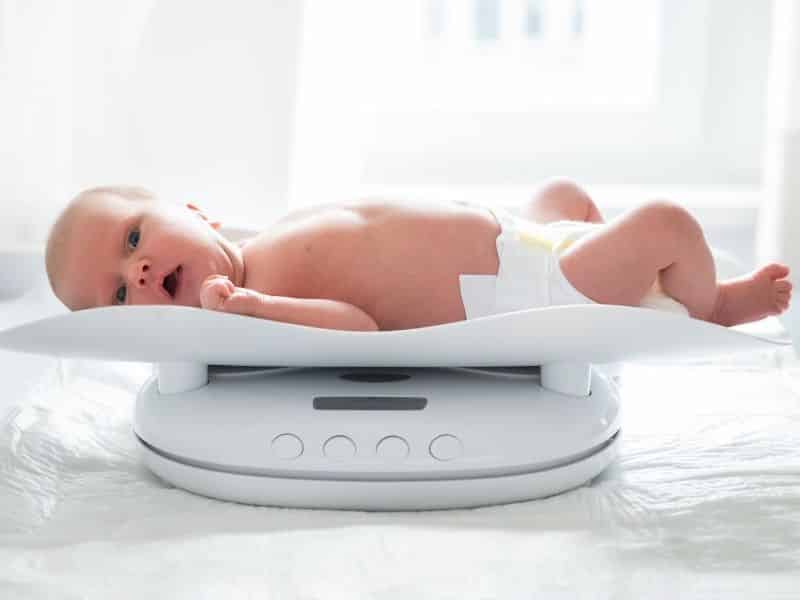
The main goal of this guide is to give you an easier time tracking your baby’s weight – at home.
What are you waiting for? Read on to find out how to weigh your baby at home – including easy and inexpensive ways.
What Are the Ways to Weigh My Baby at Home?
Knowing your baby’s weight is one way to ward off our anxieties about our child’s growth and development.
So, without further ado, here are the top ways to weigh babies at home.
Weigh Baby with a Kitchen Scale
You probably didn’t expect that, but a kitchen scale is one of the simplest ways to weigh your baby.
Of course, if you want to be exact about how much your baby weighs, a digital scale would be better than a manual one.
Image courtesy of Amazon.com
This digital scale from Zibet has a capacity of up to 33 pounds and measures every ounce. Not only that, but it has accurate measurement and quick unit conversion.
You’d be wrong if you think this kitchen scale is not durable, as it utilizes a heavy-duty design. It’s designed with tempered glass to have a strong bearing and can easily be cleaned.
To use this kitchen scale to weigh your baby, place a large bowl or a baking sheet on top of the kitchen scale. To ensure your baby’s and not lying on the cold surface, place a light sheet on top.
Once you have done this, press the tare button to zero. Place the newborn on the surface and wait for the toddler scale to weigh your baby accurately.
What Are the Pros of Using a Kitchen Scale?
Accuracy is one of the benefits of using a trusty kitchen scale. They will show you your baby’s weight down to the ounce. Out of all digital scales, this one would show accurate weight readings.
What Are the Cons of Using Kitchen Scales?
One downside of using a kitchen scale is there might be safety concerns while you weigh your baby. Remember, the household scale measures the weight of foods.
PLUS, some kitchen and specialty scales have a relatively low weight limit, and the base of the scale might not be spacious enough for the baby to fit.
Use a Bathroom Scale to Weigh Baby
The bathroom scale is one of the easiest and most popular ways to determine your baby’s weight at home. With some simple arithmetic, you’d find out how much your little one weighs in no time.
To use the bathroom scale, you would first need to weigh yourself through it. Once you have noted down your weight, it’s time to step on the bathroom scale carrying your baby.
Note that weight too, and subtract your weight from the latter. The difference between your weight and your baby combined is how much your baby weighs.
Image courtesy of Amazon.com
This bathroom scale from Etekcity contains four high-precision sensors, so it delivers highly accurate results with a 0.2lb/0.1kg accuracy. How cool is that, right?
You won’t have to worry about its durability as well, as it is designed to withstand years of use with its 6mm tempered glass platform. Not to mention it has an auto-on/off feature and a backlit LCD.
What Are the Pros of Using a Bathroom Scale?
Using a bathroom scale is SUPER easy for everyone, not to mention that it’s also safe as you won’t have to put your baby on other surfaces.
Almost everyone has a bathroom scale, so you probably won’t have to splurge on another one. If you don’t already have one, you can always buy them at a cheap price, and you can use them for a long time.
It has a greater capacity than a kitchen scale, which means your child can still use it as they grow older.
What Are the Cons of Using Bathroom Scales?
When you come to think of it, you can be sure of the weight of your little one when you’re using digital scales.
But not all scales are digital, so I advise you to get digital ones if you want more accurate readings. However, accuracy depends on what kind of baby scale one is using.
Some digital baby scales break weight down up to the ounce, while some are only in pounds.
A household-scale measures in the tenths of the nearest pound if you want a more accurate one.
Weigh Baby With a Specialty Scale
A specialty scale is a scale for a specific purpose, and it’s also one of the options to get accurate measurements when weighing your baby.
If you have gone to the doctor’s office to weigh a baby, then you’ve probably seen this. They measure your baby’s weight as well as their height.
When purchasing one, I recommend that you choose a digital or mechanical scale specifically made for infants under 20 pounds. Choose one that comes with an infant platform or attachment.
Remember, you need to tear them first before taking your baby’s weight.
To safely measure your little one’s weight, place your child’s feet against the footpad and their head pad before stepping on the baby scale.
Image courtesy of Amazon.com
This baby scale from KAZETEC has a weight limit of 220 pounds and provides an accurate reading. My favorite baby scale is the Hatch baby scale. You can find my review of the Hatch baby scale here.
Have I mentioned that it also provides an extremely accurate assessment of breastfeeding and complementary feeding?
PLUS, its design enables you to weigh your baby and act like an adult scale and a piece of weighing equipment for pets.
Check out my choices for the best baby scales and the most accurate baby scales.
What Are the Pros and Cons of Specialty Baby Scales?
Your baby’s growth is measured in all aspects, not only their weight gain or loss but also your child’s height.
It’s also comfortable for your little one to use as they can lie down on the platform while you measure your child’s weight. You can even measure it while they are sleeping.
These specialty scales that you can use to weigh your baby can also be used for your pets, but they’re not as versatile as bathroom scales which your child can use until adulthood.
One possible downside is that it’s significantly more expensive than other types of scales.
Use a Medical Height Chart to Estimate the Weight
I’ve learned in physical education that height and weight are correlated, and this is true for your little one.
All you need is a measuring tape to measure your child’s height, and from this, you will already get an idea of their weight. You can use this information to calculate their weight in pounds.
This is one of the lesser-known methods of how to weigh your baby at home. To do this, you have to determine how tall your child is while their feet are against a flat surface and their backs are straight.
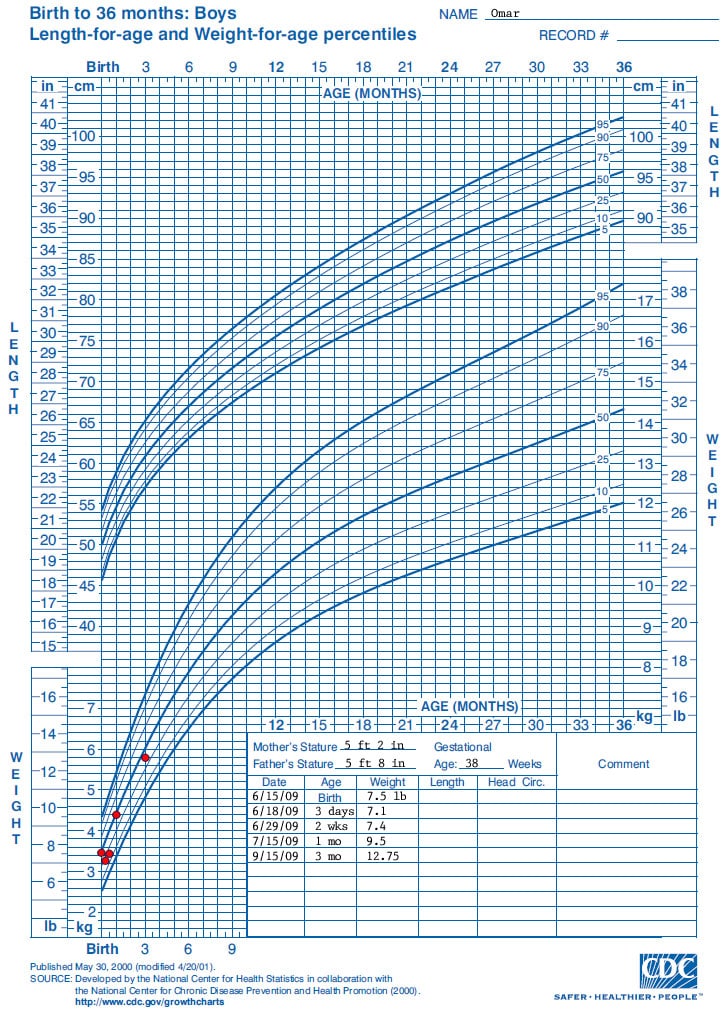
Measure that distance with the measuring tape. To find out your child’s weight, divide the height in inches by 12, and you will get the pounds [R].
DISCLAIMER: This method may not be accurate, but you should be good as long as you know which percentile you use for your baby.
What Are the Pros and Cons of a Growth Chart?
It’s relatively cheaper and does not require a scale if you’re not too keen on purchasing one.
You would benefit more from a growth chart during the first year of your little one, when you’re tracking their birth weight and through gaining weight or losing weight.
However, if you want to record accurate readings, you would need equipment for that.
Why Should You Weigh Your Baby at Home?
Shortly after being born, the birth weight of babies is recorded. That’s why when newborns gain weight, you should monitor them through the first few weeks and months.
Medical professionals won’t always be around to assist you when observing the growth pattern of our little ones.
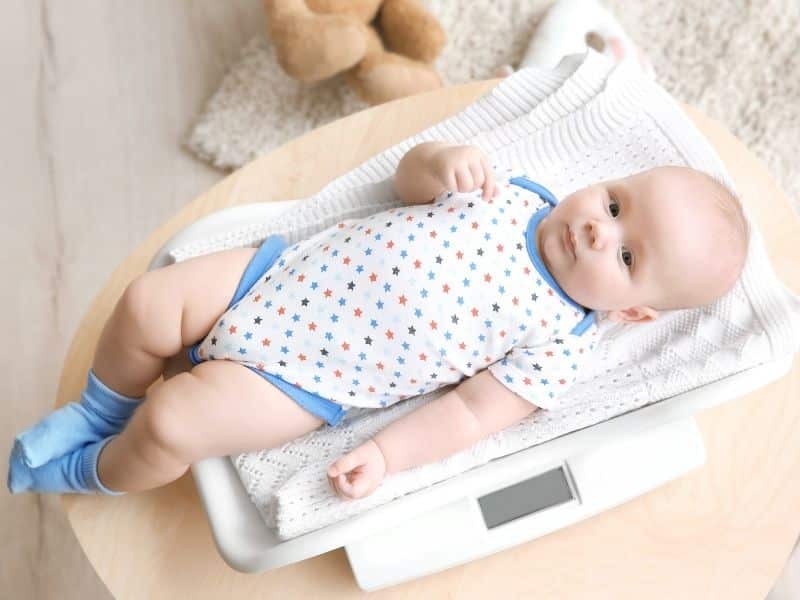
It may be worrying for some parents if their baby is gaining weight or losing weight out of the normal pace, especially for a newborn baby.
The first weight of your baby is vital to determine if your baby is in the healthy range, according to their age.
PLUS, weight is an essential part of the growth charts, too, and a family doctor would recommend monitoring the weight of a baby in their first weeks and months.
Especially if you are on the lookout for underlying health issues or having problems with your milk supply – in which case babies lose weight faster.
This can cause an alert in first-time parents.
How Often Should I Weigh a Baby at Home?
The World Health Organization has set some samples and methods to standardize monitoring your baby at home. [R]
According to the National Honor Society (NHS), a baby scale should be used to weigh your baby on their birth and during the first two weeks of their life., especially for those who do weighted feedings.
After that, you should bring out the baby scale:
- Once a month -at most – until they are 6 months of age
- Once every two months between 6-12 months
- Once every three months when they are over 1 year old
Your baby will be put to the toddler scale more times than they’d like, but knowing how to weigh your baby at home is an essential skill for all parents.
If you want to weigh more often than what is stated above, weigh your baby, especially if you feel like something is wrong.
But, I advise you not to weigh your baby within an unreasonable interval, as this might cause unnecessary worry if the baby scale does not show much difference as expected.
Of course, I don’t want you to go through that extra stress of figuring out why your baby does not show the weight gain you expected. Avoid unnecessary stress when you are taking care of a newborn.
What’s the Average Weight Gain for Newborns Weekly?
When it seems like it’s taking forever for your little one to grow and gain weight, don’t worry yourself too much.
Most babies are born in healthy sizes, between 5 pounds, 8 ounces, or 2,500 grams, and 8 pounds, 13 ounces, or 4,000 grams.
Did you know that it’s even normal for babies to lose 7-10% of their weight from their birth within the first few days? [R] Yup, it’s not a reason to panic, but it’s understandable if you do so.
Although, they should be able to regain that within the first 14 days from their birth. After that, it reaches a steady growth of about 1 ounce or 30 grams per day.
Other newborns go through a fast growth during their first 7 to 10 days, and another spurt at their third and sixth week wherein they can gain more than 1 ounce per day.
However, if your baby does not fit these guidelines, it’s not a reason to worry. If you want to clear your mind and have professional support, you can always talk to a medical expert or your baby’s pediatrician.
Lastly, there are also a lot of weight charts circulating online. These show the growth patterns of healthy babies. Remember, the important thing is for your child to be in the 50th percentile.
What Should I Do if My Baby Has Lost Weight?
First things first, some weight loss is normal for babies, and some are not. As I’ve said, weight loss in babies is expected after birth, but they should regain that in the following weeks.
One sign of harmful weight loss is when your little one has lost more than 10% of their body weight in the first two weeks.
However, if that’s not the case, but you still notice that your baby is not gaining weight compared to others, it might be helpful to continue tracking their weight and see the good signs of feeding.
There are several signs that your baby is getting their needed food intake, such as regularly having wet and dirty diapers. It’s also another good sign when they are active.
Another sign is when they seem satisfied after eating, and your baby alerts you too when they are feeling hungry.
If you have noticed that your baby does not do these, then I advise you to seek the advice of a doctor or your healthcare provider.
Weight loss in babies might be caused by how they latch to you or another underlying concern. Either way, you’ll be eased from your worries if you talk to your doctor.
Which Weighing Method Is Ideal for Me?
With all the methods I presented above, it may get overwhelming for you which one to try. What’s ideal for you will depend on what you’re looking for when weighing your baby at home.
If you don’t need to know the ounces and are alright with knowing the pounds, then a bathroom scale would do the trick. You can also do weighted feedings and your height chart.
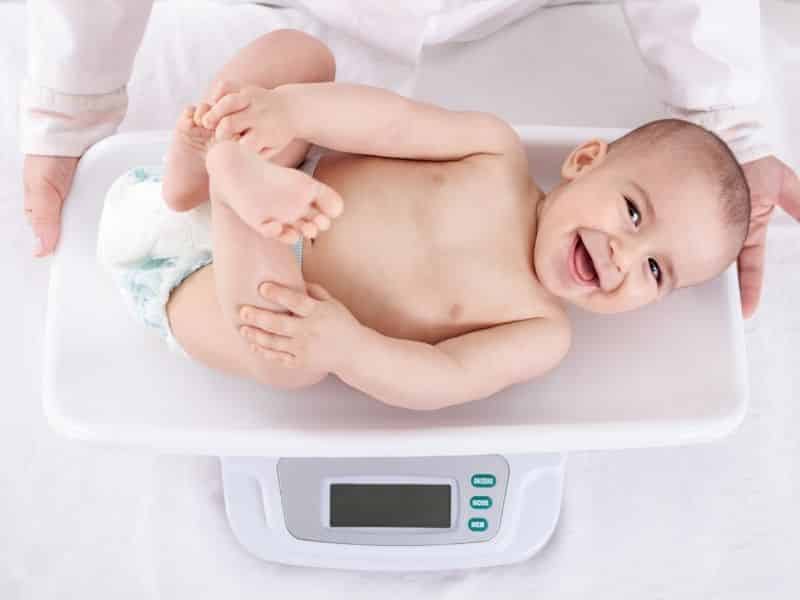
But, if you want more details when it comes to tracking your baby’s growth at home, a specialty scale or a digital scale for babies is what you need.
There is no “one size fits all” when it comes to tracking your baby’s height and weight, but I recommend that you ask your physician how you can best monitor your child’s progress.
Healthy babies would not need frequent monitoring, but others with health concerns and conditions may need special care when tracking their height and weight.
Do’s and Don’ts of Weighing Your Baby at Home
Let’s go over some things you SHOULD and SHOULD NOT do when determining how many pounds or kilograms your child weighs.
Do’s
- If you are using a weighing scale, make sure to sanitize the scale or put a sheet on it before putting your little one. This would ensure that your baby is safe from germs and bacteria.
- Speak to your doctor about any concerns. The first few weeks after birth can be a stressful phase for first-time parents, so be sure to talk with your doctor about your concerns.
- Make a digital copy of your tracker. This would ensure that you won’t have to fret if your physical copy gets lost. A backup file is always welcome.
Don’ts
- Don’t overthink about every little thing. Most of us worry whenever something feels a little off, and that’s understandable. Rather, speak about it to your doctor instead of figuring it out yourself.
- Don’t monitor more frequently than necessary.
Final Thoughts
I hope this guide gave you a better idea of the steps, tips, and tricks on how to weigh your baby at home.
Indeed, you won’t have any more sleepless nights worrying about not knowing your child’s weight.
Trust me! Your first few days as a new parent will be less stressful once you master these weighing techniques.
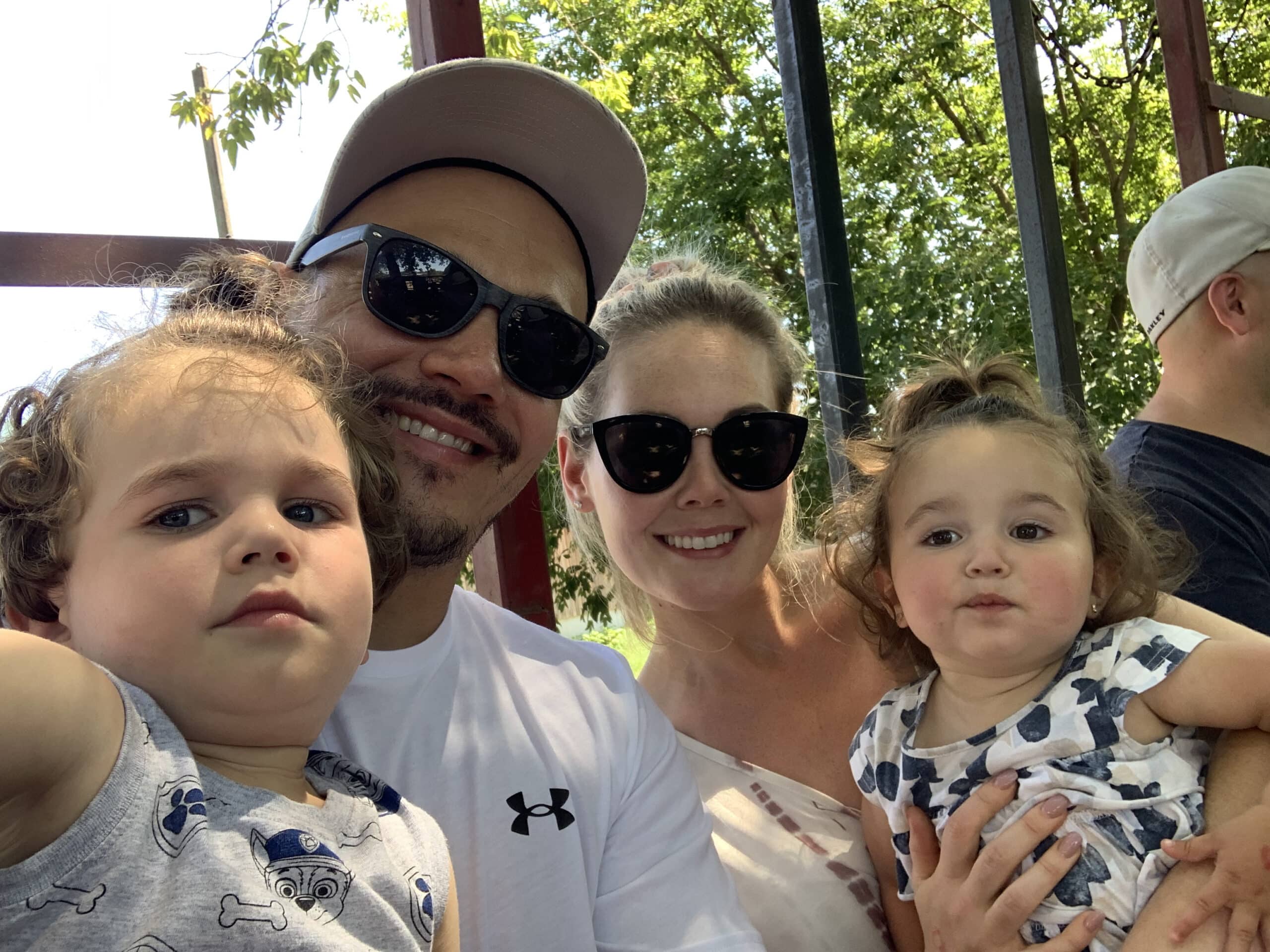
Steph is a passionate mom who co-founded Wumblers to share her parenting journey with others. She graduated from Concordia University with a masters degree in Education Technology and worked as an advisor for many years. Steph loves being a mom and wants to have more kids.
Learn more about Steph and Wumblers here.


